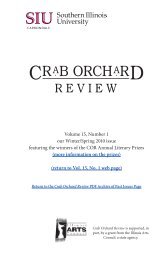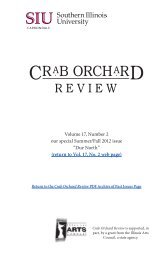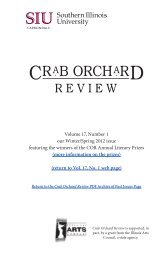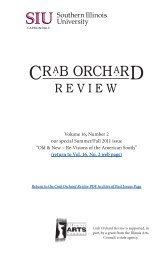- Page 1:
C B ORCH RD R A • R E V I E W Vol
- Page 4 and 5:
Address all correspondence to: CRAB
- Page 6 and 7:
Crab Orchard Review wishes to expre
- Page 9 and 10:
C B ORCH RD R A • SUMMER/FALL 200
- Page 11 and 12:
Mitchell L. H. Douglas Inhabit 56 J
- Page 13:
Elizabeth Rees First Offering 180 S
- Page 17 and 18:
Sally Bellerose Brinkmanship The fa
- Page 19 and 20:
Sally Bellerose “Get us to the br
- Page 21 and 22:
Sita Bhaskar Swayamvaram The paper
- Page 23 and 24:
Sita Bhaskar not embroidered or lac
- Page 25 and 26:
Sita Bhaskar the truck. At first sh
- Page 27 and 28:
Sita Bhaskar Minister was in danger
- Page 29 and 30:
Sita Bhaskar to each other and thru
- Page 31 and 32:
Sita Bhaskar of the tent and decide
- Page 33 and 34:
Christopher Ankney Churches Kutna H
- Page 35 and 36:
William Baer The Gathering of the C
- Page 37 and 38:
The Funeral Erinn Batykefer Little
- Page 39 and 40:
of the past, which the future wears
- Page 41 and 42:
Tamiko Beyer Shichi-Go-San Tokyo, N
- Page 43 and 44:
Michelle Bitting Remains Out of the
- Page 45 and 46:
Helen Cho “Today is Korean New Ye
- Page 47 and 48:
When I finally understand Nicole Co
- Page 49 and 50:
Melissa Crowe inside her for a whol
- Page 51 and 52:
Chad Davidson Advent There’s a sa
- Page 53 and 54:
Oliver de la Paz Now, Amador walks
- Page 55 and 56:
Daniel C. Bryant (though I never he
- Page 57 and 58:
Chris Gavaler Recipe for Giblets It
- Page 59 and 60:
Chris Gavaler try to hand me her ph
- Page 61 and 62:
Heather E. Goodman “Snapper soup
- Page 63 and 64:
Heather E. Goodman “I can do it,
- Page 65 and 66:
Heather E. Goodman over. Coolly, he
- Page 67 and 68:
Heather E. Goodman we visited the s
- Page 69 and 70:
Heather E. Goodman and in between r
- Page 71 and 72:
Heather E. Goodman anything over be
- Page 73 and 74:
to another room. Heel of hand to pa
- Page 75 and 76:
Shawn Fawson In the Bathhouse You k
- Page 77 and 78:
Chanda Feldman Immersion In Judaism
- Page 79 and 80:
Chanda Feldman the thick braid as I
- Page 81 and 82:
Yahya Frederickson for the house’
- Page 83 and 84:
Lisha Adela García San Fernando Ca
- Page 85 and 86:
Ramón García Passion Play Christ
- Page 87 and 88:
Susan Grimm of appletinis wait. Pro
- Page 89 and 90:
Randall Horton 14 th and Park Road,
- Page 91 and 92:
Kelly Houle Touching the sleeves to
- Page 93 and 94:
Luisa A. Igloria We thought she’d
- Page 95 and 96:
Donna Hemans Lucky My mother has be
- Page 97 and 98:
Donna Hemans in a way she didn’t.
- Page 99 and 100:
Donna Hemans girlhood. We’d been
- Page 101 and 102:
Donna Hemans As I left, she was tak
- Page 103 and 104:
Donna Hemans “What’s there to d
- Page 105 and 106:
Donna Hemans children, from whom sh
- Page 107 and 108:
Donna Hemans “What did you do?”
- Page 109 and 110:
Donna Hemans circumstances, I don
- Page 111 and 112:
Melanie Jennings make sense of it a
- Page 113 and 114:
Melanie Jennings From the carsick r
- Page 115 and 116:
Melanie Jennings I had stayed over
- Page 117 and 118:
Melanie Jennings little louder than
- Page 119 and 120:
Melanie Jennings laughter and the g
- Page 121 and 122:
Bryan Tso Jones Rituals on the Day
- Page 123 and 124:
Bryan Tso Jones Her bones were plac
- Page 125 and 126:
Colette Jonopulos Her Boy …it is
- Page 127 and 128:
Letter on Another Occasion for Arli
- Page 129 and 130:
Elizabeth Langemak wears both bands
- Page 131 and 132:
Donna J. Gelagotis Lee From the 21
- Page 133 and 134:
Midge Raymond Water Children I foun
- Page 135 and 136:
Midge Raymond expressions. I find m
- Page 137 and 138:
Midge Raymond and it’s been espec
- Page 139 and 140:
Midge Raymond As we enter the livin
- Page 141 and 142:
Midge Raymond long time. It was ama
- Page 143 and 144:
Terez Rose No Home for the Holidays
- Page 145 and 146:
Terez Rose “Okay, the joke’s on
- Page 147 and 148:
Terez Rose all over—the glitter,
- Page 149 and 150:
Terez Rose and homemade batiks deco
- Page 151 and 152:
Terez Rose The women of the village
- Page 153 and 154:
Terez Rose Although she has grown u
- Page 155 and 156:
Terez Rose acceptance letter from t
- Page 157 and 158:
while the wedding of every evening
- Page 159 and 160:
Angie Macri Then I had that lifting
- Page 161 and 162:
Melanie Martin This passage grave,
- Page 163 and 164:
Christopher Matthews Christmas Post
- Page 165 and 166:
Karyna McGlynn After My Fifth Birth
- Page 167 and 168:
nested glass bubble. Sweet Somethin
- Page 169 and 170:
of Hebrew earlier that day, to feel
- Page 171 and 172:
Mihaela Moscaliuc I try to read my
- Page 173 and 174:
Lisa Ortiz Easter Poem That sunset
- Page 175 and 176:
Laura Paul Prayer for the End of Th
- Page 177 and 178:
Kim Foote the only time each year t
- Page 180 and 181:
164 ◆ Crab Orchard Review Kim Foo
- Page 182 and 183:
166 ◆ Crab Orchard Review Kim Foo
- Page 184 and 185:
Debra Gwartney 168 ◆ Crab Orchard
- Page 186 and 187:
170 ◆ Crab Orchard Review Debra G
- Page 188 and 189:
172 ◆ Crab Orchard Review Debra G
- Page 190 and 191:
174 ◆ Crab Orchard Review Debra G
- Page 192 and 193: 176 ◆ Crab Orchard Review Debra G
- Page 194 and 195: Sara Pennington Year of the Locust
- Page 196 and 197: Elizabeth Rees First Offering When
- Page 198 and 199: Shane Seely First Anniversary for S
- Page 200 and 201: Sylvia’s Wedding Reception Once i
- Page 202 and 203: Foot Washing I draw bath water, sti
- Page 204 and 205: Adrienne Su In Labor Those who’ve
- Page 206 and 207: Alison Townsend Unexpected Harvest
- Page 208 and 209: Ruby Slippers in memory of Richard
- Page 210 and 211: R. A. Villanueva Mine will be a bea
- Page 212 and 213: All Souls’ Day Cemetario del Nort
- Page 214 and 215: Jeremy B. Jones On Honduran Airwave
- Page 216 and 217: 200 ◆ Crab Orchard Review Jeremy
- Page 218 and 219: 202 ◆ Crab Orchard Review Jeremy
- Page 220 and 221: 204 ◆ Crab Orchard Review Jeremy
- Page 222 and 223: Nishta J. Mehra 206 ◆ Crab Orchar
- Page 224 and 225: 208 ◆ Crab Orchard Review Nishta
- Page 226 and 227: 210 ◆ Crab Orchard Review Nishta
- Page 228 and 229: 212 ◆ Crab Orchard Review Nishta
- Page 230 and 231: 214 ◆ Crab Orchard Review Nishta
- Page 232 and 233: kittens. Two white boys attempt to
- Page 234 and 235: Book Reviews Magee, Kelly. Body Lan
- Page 236 and 237: 220 ◆ Crab Orchard Review Book Re
- Page 238 and 239: 222 ◆ Crab Orchard Review Book Re
- Page 240 and 241: 224 ◆ Crab Orchard Review Book Re
- Page 244 and 245: 228 ◆ Crab Orchard Review Book Re
- Page 246 and 247: 230 ◆ Crab Orchard Review Book Re
- Page 248 and 249: 232 ◆ Crab Orchard Review Contrib
- Page 250 and 251: 234 ◆ Crab Orchard Review Contrib
- Page 252 and 253: 236 ◆ Crab Orchard Review Contrib
- Page 254 and 255: from the Iowa Writers’ Workshop,
- Page 256 and 257: Line Press and his first full lengt
- Page 258 and 259: Adrienne Su is the author of two bo
- Page 260 and 261: INDEX OF BOOK REVIEWS — 1997/2007
- Page 262 and 263: INDEX OF BOOK REVIEWS — 1997/2007
- Page 264 and 265: INDEX OF BOOK REVIEWS — 1997/2007
- Page 266 and 267: Book Review Policy Crab Orchard Rev
- Page 268 and 269: Announcements Crab Orchard Review i
- Page 270 and 271: Crab OrcharD Series In Poetry 2007
- Page 272 and 273: the Crab Orchard Series in Poetry 2
- Page 274 and 275: the Crab Orchard Series in Poetry 2
- Page 276 and 277: the Crab Orchard Series in Poetry 2
- Page 278 and 279: the Crab Orchard Series in Poetry 2
- Page 280 and 281: the Crab Orchard Series in Poetry 2
- Page 282 and 283: the Crab Orchard Series in Poetry 2
- Page 284 and 285: the Crab Orchard Series in Poetry 2
- Page 286 and 287: the Crab Orchard Series in Poetry 2
- Page 288 and 289: the Crab Orchard Series in Poetry 1
- Page 290 and 291: the Crab Orchard Series in Poetry 2
- Page 292 and 293:
the Crab Orchard Series in Poetry 2
- Page 294 and 295:
Crab OrcharD Series In Poetry FIRST
- Page 296 and 297:
Crab OrcharD Series In Poetry FIRST
- Page 298 and 299:
Crab OrcharD Series In Poetry FIRST
- Page 300 and 301:
The Charles Johnson Student Fiction
- Page 302 and 303:
CO R B ORCH R CR D A A • • R E
- Page 304 and 305:
A Call for Submissions Special Issu






